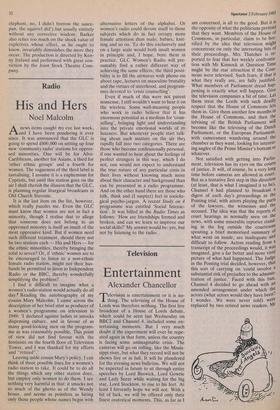Radio
His and Hers
Noel Malcolm
Anews items caught my eye last week, and I have been pondering it ever since. It was announced that the GLC is going to spend £600,000 on setting up four new 'community radio' stations for oppres- sed minorities. One will be for Afro- Caribbeans, another for Asians, a third for 'other ethnic groups' and a fourth for women. The vagueness of the third label is tantalising. I assume it is a euphemism for Cypriots, but until this station goes on the air I shall cherish the illusion that the GLC, is planning regular liturgical broadcasts in Old Church Slavonic.
It is the last item on the list, however, which really puzzles me. Even the GLC must know that women are not in fact a minority, though I realise that to allege that someone does not belong to an oppressed minority is itself an insult of the most oppressive kind. But if women need such different treatment, should there not be two stations each — His and Hers — for the ethnic minorities, thereby bringing the total to seven? Or, if `ethnic' women are to be encouraged to listen to a non-ethnic female radio station, might not their hus- bands be permitted to listen to Independent Radio or the BBC, thereby wonderfully simplifying the problem?
I find it difficult to imagine what a women's radio station would actually do all day! Reading the autobiography of my cousin Mary Malcolm, I came across the description of her brief stint as producer of a women's programme on television in 1949: 'I declared against ladies in smocks dispensing culture, and in favour of as many good-looking men on the program- me as was reasonably possible. This point of view did not find favour with the feminists on the fourth floor of Television Tower, and I was thanked for my efforts and "retired".'
Leaving aside cousin Mary's policy, I can think of three possible lines, for a women's radio station to take. It could be to do all the things which any other station does, but employ only women to do them. I see nothing very harmful in that: it smacks not so much of the ghetto as of the Wendy house, and seems as pointless as hiring only those people whose names begin with alternative letters of the alphabet. Or women's radio could devote itself to those subjects which do in fact occupy more female attention than male: babies, knit- ting and so on. To do this exclusively and on a large scale would both insult women in principle and, I hope, bore them in practice. GLC Women's Radio will pre- sumably find a rather different way of achieving the same effects; the third possi- bility is to fill the airwaves with phone-ins about rape, lectures on masculine brutality and the virtues of sisterhood, and program- mes devoted to 'crisis counselling'.
Even if much of this were not patent nonsense, I still wouldn't want to hear it on the wireless. Some well-meaning people who work in radio believe that it has enormous potential as a medium for 'coun- selling', bringing light and understanding into the private emotional worlds of its listeners. But whenever people start talk- ing about such matters on the air they rapidly fall into two categories. There are those who become confessionally personal; if one wanted to hear about the feelings of perfect strangers in this way, which I do not, one would not expect to understand the true nature of any particular crisis in their lives without knowing much more about their character and background than can be presented in a radio programme. And on the other hand there are those who talk, think and (I suspect) feel in sociolo- gical psycho-jargon. A recent Study on 4 programme was entitled `Social Interac- tion'. It was billed in the Radio Times as follows: `How are friendships formed and broken, and can we learn to improve our social skills?' My answer would be: yes, but not by listening to the radio.










































 Previous page
Previous page